Odoo, the On Demand Open Object is open-source business management software, that empowers small to large businesses with a wide range of applications for various business types and their operations. Mostly Odoo is linked with the Linux environments, but installing it on the Windows operating system is a very straightforward process that brings the power of the robust ERP system to Windows users. So this guide will help you to install Odoo 17 on Windows
Table of Contents
Why Choose Odoo on Windows?
Linux operating system is a trendy choice for hosting odoo online. Due to its stability and performance, it makes it visible to the users, but using Linux for normal users is unsuitable and they prefer the Windows OS. Installing Odoo on Windows allows businesses and developers to leverage Odoo’s capabilities without needing a Ubuntu Linux server setup. This super flexibility of Odoo ERP makes it more accessible to a larger audience.
Steps to Install Odoo 17 on Windows
- Python 3.10 Installation.
- PostgreSQL Installation
- pgAdmin4 and PSQL Configuration
- C++ Kit Using Visual Studio Tools
- Downloading Odoo 17 from Github.
- PyCharm Installation
- Configuring Odoo 17 Development environment in Pycharm
Step 1: Install Python 3.10 on Windows
Installing Python on your system is the first requirement for installing Odoo 17 on Windows. However, ensure Python is not installed on your Windows system before proceeding. You can check whether Python is installed on your system or not, by using the “Python” command on the command prompt it will return the Python version if your system has Python installed.

If your system doesn’t have Python installed then you will get an error message saying something like “Python is not recognized as an internal or external command, operable program, or batch file.” For Odoo 17, we need Python 3.10 or 3.11, In my point of view, it’s best for odoo installation.
Install Python from the official website: https://python.org/downloads/release/python-3100/
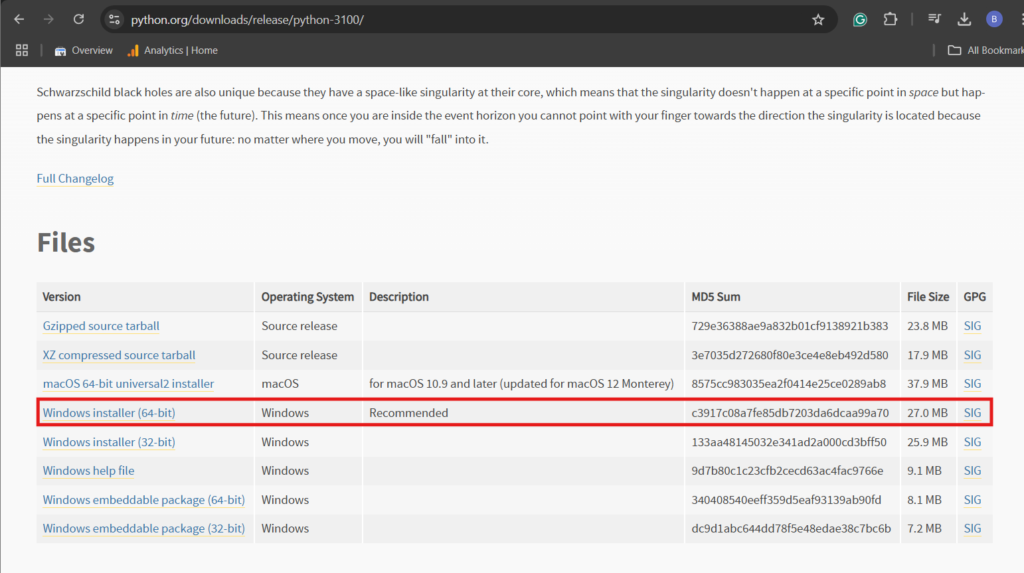
While installing the “python-3.10.0-amd64.exe” package, choose the “Install Now” option and also check the “Add Python 3.10 to PATH” box and It will start the installation process.
Step 2: Install PostgreSQL on Windows
After installing Python, Install PostgreSQL on your machine, directly download and install PostgreSQL from the website of PostgreSQL:
Download Link: https://www.enterprisedb.com/downloads/postgres-postgresql-downloads
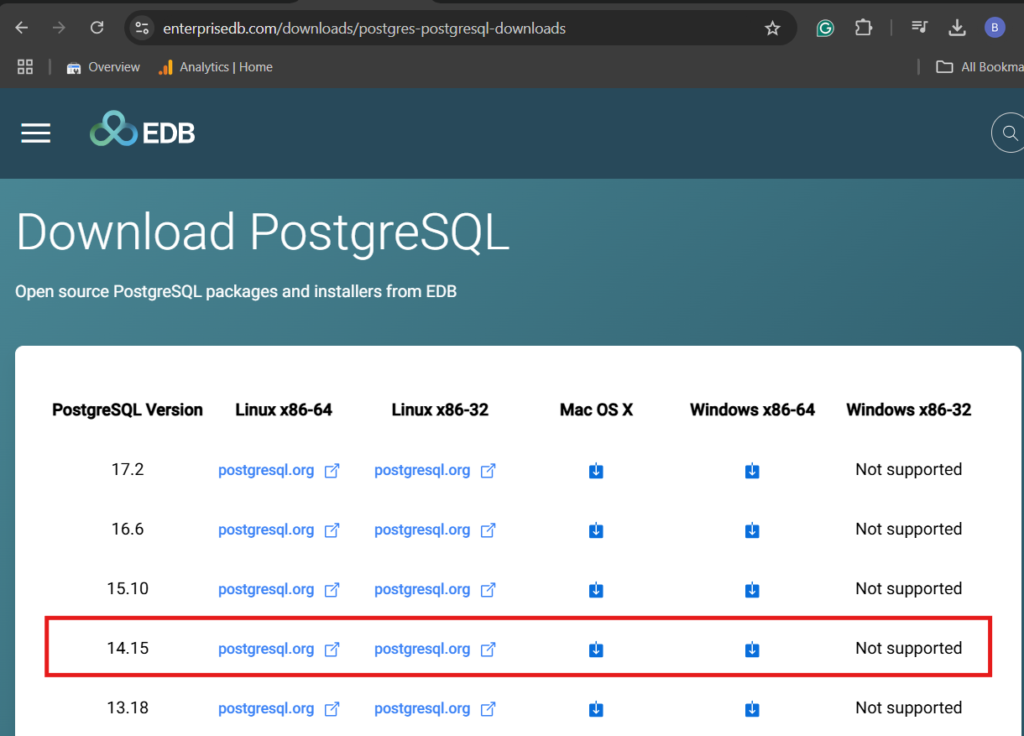
You can download version 13.18 or later will be better for Odoo, click on the download icon under the “window x86-64” option. Then install the package and while installing the exe file, check all components on the “Select Components” page of the installer, and provide a super user password on the “Password” Page and other configurations should be the same.

After the installation of PostgreSQL, there will be a Stack Builder wizard for installing additional components for PostgreSQL. In that wizard, select all the applications under the “Database Driver”, and then click on the next button.
Step 3: pgAdmin4 and PSQL Configuration
While installing PostgreSQL, we selected pgAdmin on the component page of the installer, So search for “pgAdmin” open it, expand the “Server” in the Object Explorer, and enter the password to access it. Under the Servers, expand the Postgres Object, and then you can see the option “Login/Group Roles“. Right-click on the Login/Group Roles and create a new role.
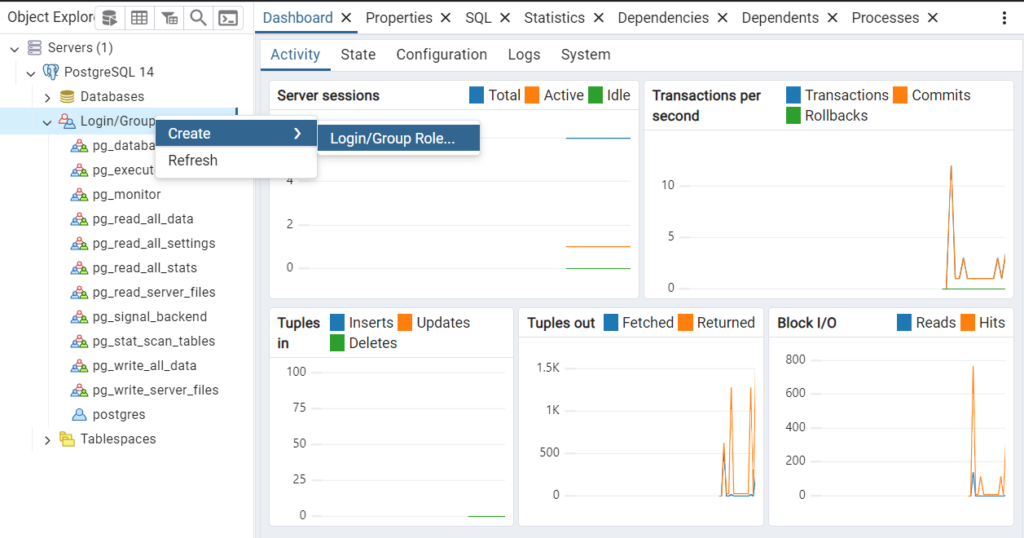
In the general tab, give the name of the role, and password in the Definition tab.

In the “Privileges” Tab, Enable all options and save it.

Step 4: Installation of C++ kit Using Visual Studio Tools
C++ is a foundation language for Windows application development. Visual Studio provides tools and libraries that make it easier for developers to create Windows application services using C++.
You can download the C++ Built Tools installer directly from the official website: [https://visualstudio.microsoft.com/visual-cpp-build-tools/]

When installing the installer, check “Desktop Development With C++” and select optional components as shown in the figure.
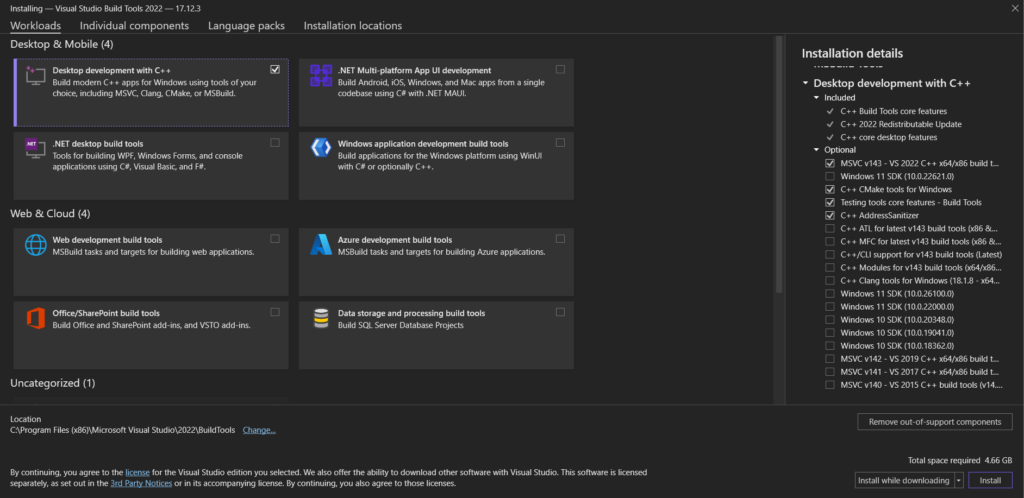
Restart your desktop after the installation to make changes.
Step 5: Download Odoo 17 from GitHub
After the installation of the C++ kit, downloading the Odoo 17 from GitHub is an easy process. For that go to Google and search “Odoo 17 GitHub”. you will see below the image then confirm the branch, and click the “Code” Button and you can download the zip option.
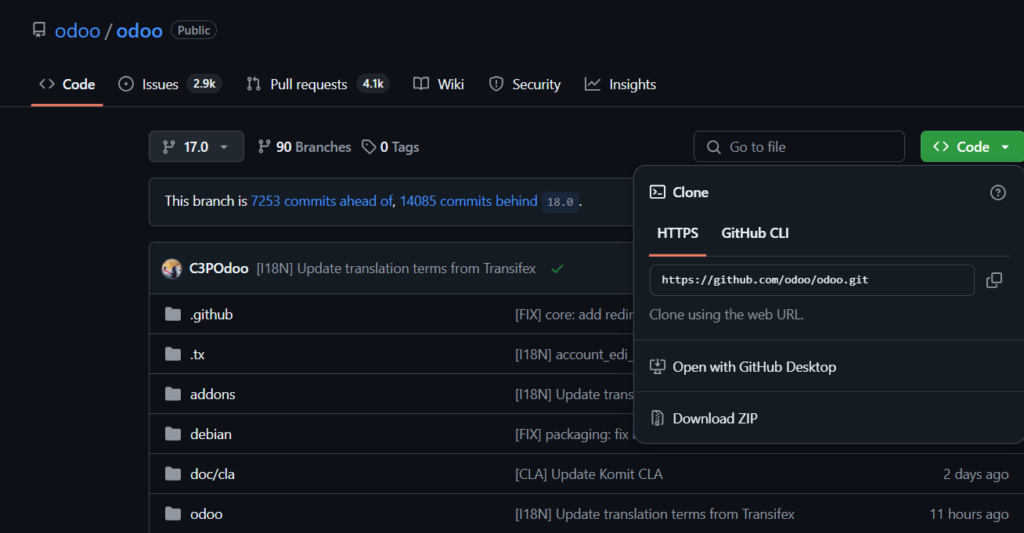
Extract it and keep it in a safe location.
Step 6: Pycharm Installation
Before installing your system should have the following requirements:
| Requirement | Minimum |
| RAM | 4GB of free RAM |
| CPU | Any Modern CPU |
| DISK SPACE | 3-5GB |
| MONITOR RESOULTION | 1024X768 |
I hope your system meets these requirements. If yes then you can download Pycharm Community from the official JetBrains website – Pycharm Community Download
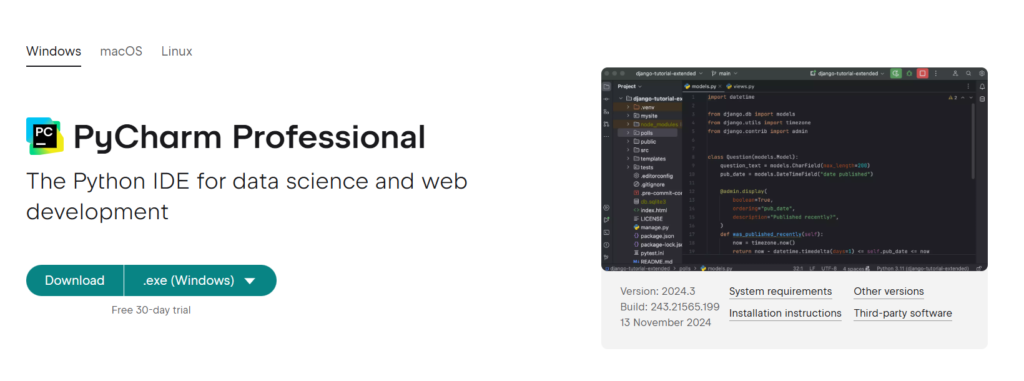
Select the installation option while installing the Pycharm community version like the below-mentioned:
Add the “bin” folder to the PATH, and Add “Open Folder as Project“
Complete the installation process
Step 7: Configuring the Odoo 17 Development Environment in Pycharm
Now, the final step for the Odoo17 configuration is setting up the Environment.
For that, open the Pycharm and click on “Open Existing Project”.
Choose the extracted Odoo17 folder and click ok.
Now create a file and give the name as odoo.conf inside the Odoo directory.
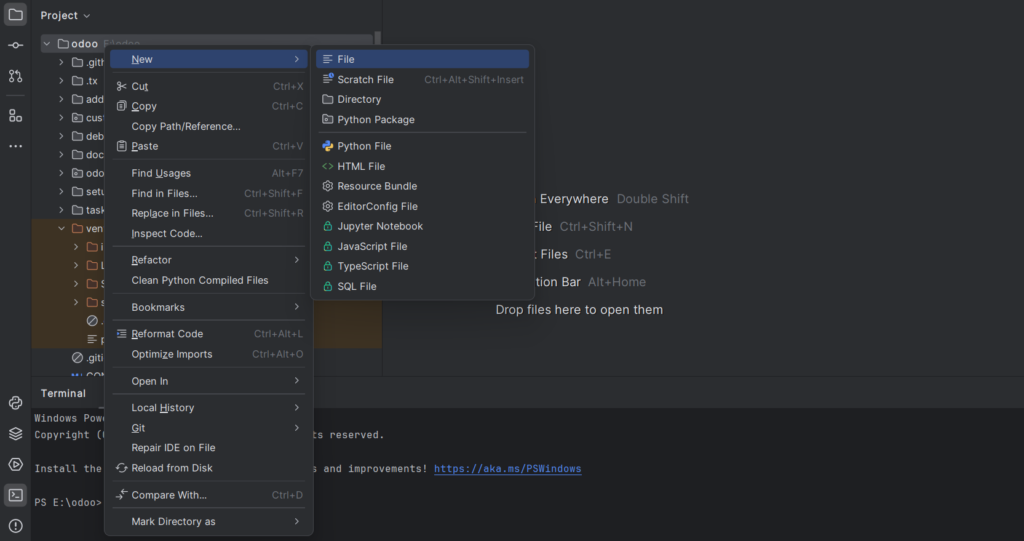
Paste the below code inside the odoo.conf file:
[options]
; Is This The Password That Allows Database Operations:
admin_passwd = admin
db_host = localhost
db_port = 5432
db_user = odoo
db_password = odoo
addons_path = /home/user/odoo/addons
xmlrpc_port = 8017Change the db_user and db_password which are set in Step 3 and also change the addons_path with the addons directory inside your odoo directory.

After setting up the odoo.conf file, we have to set up the Python Interpreter. For that, go to Settings -> Project Settings -> Python Interpreter.
Click on “Add Local Interpreter”.
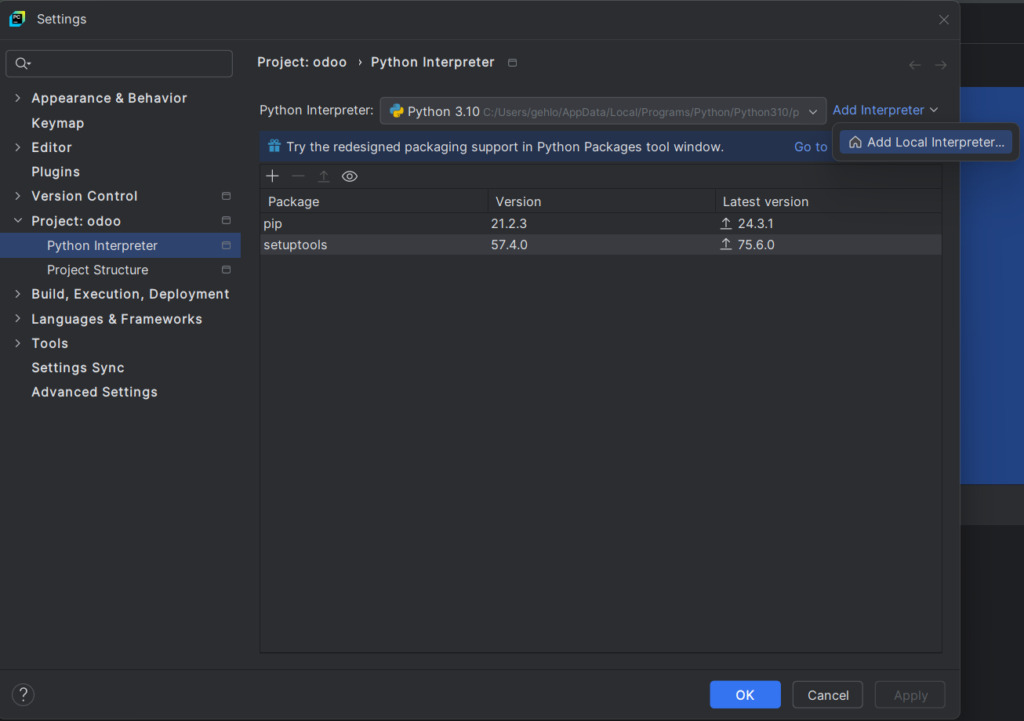
Select the interpreter as “System Interpreter” as shown in the figure then click OK.
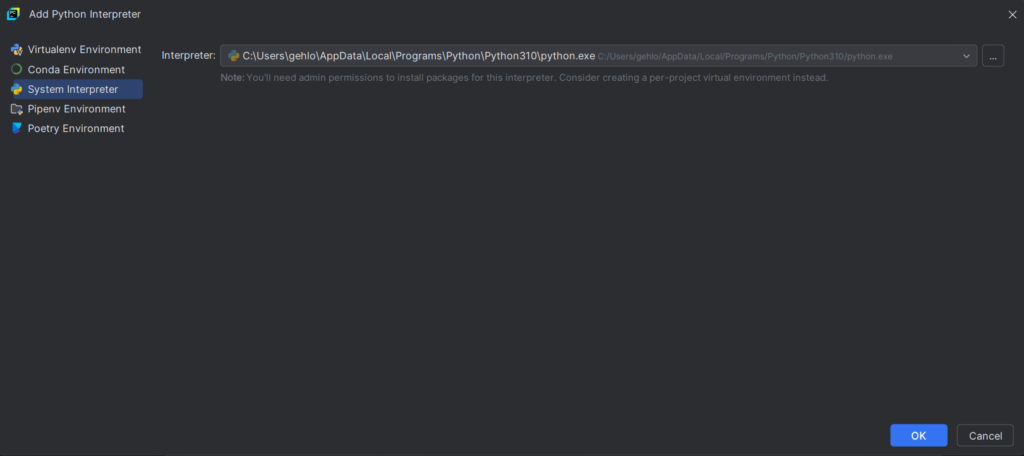
Now we have an interpreter for running the odoo instance, now we need to create the configuration for running the Odoo17 instance. For that, under the “Current File” option select “Edit Configuration.” (Top Right)
Add a new configuration using the Plus Icon from the top left the tb and choose the python from the tab options.

Fill up the information on the configuration os shown in the image:
- Give the name for the configuration
- Select the “Script Path” as an “Odoo-bin” file from the extracted odoo directory (Main Project Directory)
- Set Python Interpreter Only if not shown already
- Working directory choose the extracted project folder
- parameters: -c odoo.conf
Then click on Apply and OK.

Now we are ready to run our Odoo instance by clicking the play icon next to the configuration option or by shortcut key Shift+F10.
It can return an error because maybe some Python package will be missing on your Python interpreter, and then Pycharm will show the missing package. You can add it to the Python interpreter by adding it manually.
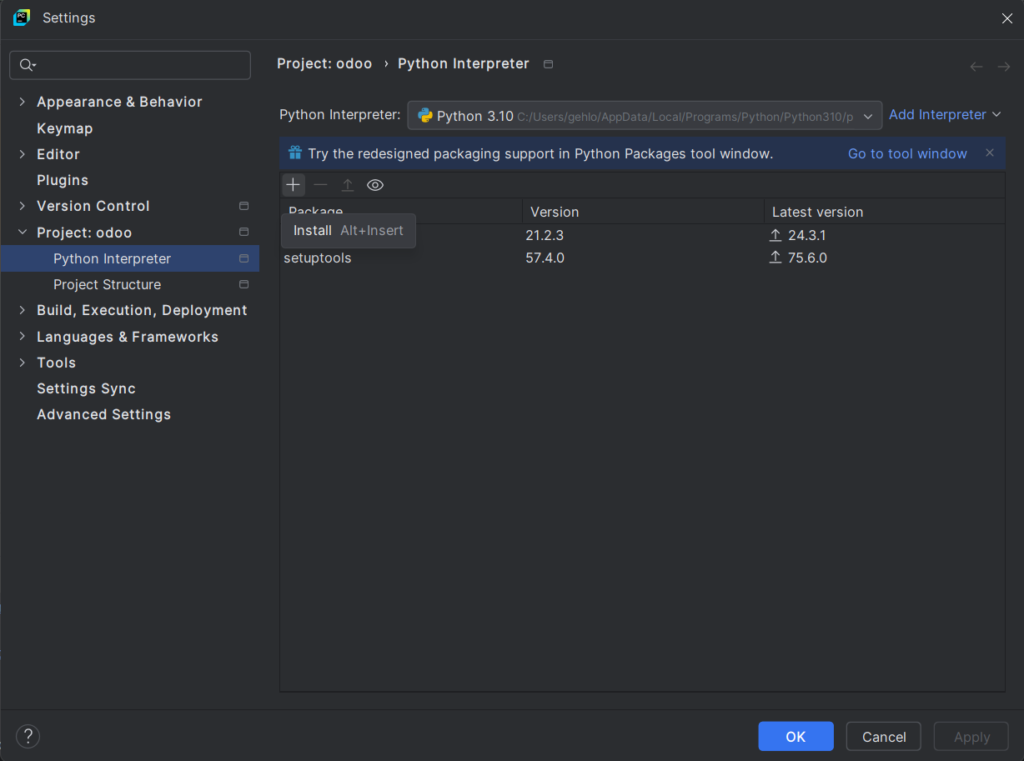
Some packages need to be installed with alternate packages which are:
| Missing Package | Alternate Package for Install |
| pyycopg2 | psycopg2-binary |
| PIL | PIL-Tools |
| dateutil | dateutils |
| Win23service | pypiwin32 |
After installing all the missing packages, run the instance. Open the browser and paste the “localhost:8017” address, and you’re all set.
Related Posts:
>> How to Add Chatter in Form View in Odoo 17
>> What is Odoo OWL JS Framework? An Odoo’s Front-End Framework
Conclusion for Install Odoo 17 on Windows
In conclusion, installing Odoo 17 on Windows can be a smooth and straightforward process if you follow the right steps. From setting up Python and PostgreSQL to configuring the Odoo environment in PyCharm, each step ensures that Odoo runs efficiently on your Windows machine. This setup brings the power of Odoo’s ERP system to users who prefer Windows over Linux, expanding its accessibility to a larger audience.
With the detailed guide provided, even beginners can confidently install Odoo 17 on Windows, and run smoothly. If any issues arise during installation, troubleshooting is easy with a clear path to resolving common problems. Happy Odoo development!
Thank You.




